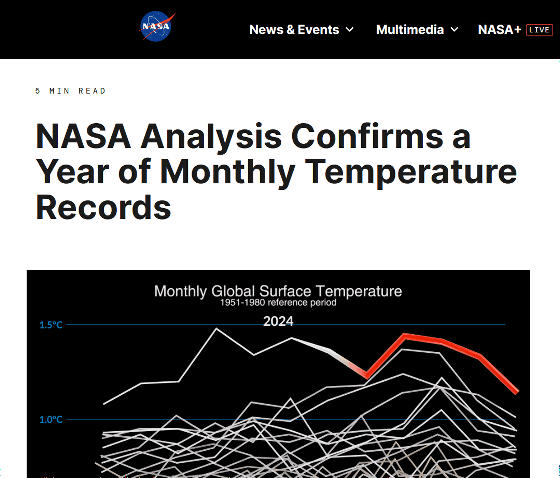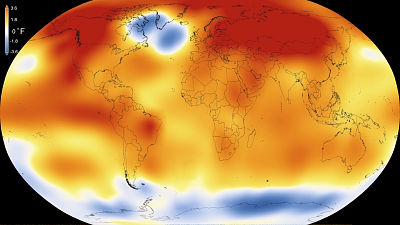NASA reports that June 2023 to May 2024 was the 'hottest month ever'

May 2024 will be the 'hottest May ever recorded,' with NASA scientists confirming that the monthly temperature was the highest ever recorded for the month of May. As a result, NASA reports that each month will be the 'hottest ever' for the 12 months from June 2023 to May 2024.
NASA Analysis Confirms a Year of Monthly Temperature Records - NASA

NASA Confirms: Every Month For Last Year Was Hottest on Record : ScienceAlert
https://www.sciencealert.com/nasa-confirms-every-month-for-last-year-was-hottest-on-record
In recent years, global warming due to greenhouse gas emissions has become increasingly serious, with July 2023 being recognized as the 'hottest month since 1880,' and the Indian capital, Delhi, recording the highest temperature ever recorded, 52.9 degrees Celsius, on May 29, 2024 local time.
NASA has confirmed that May 2024 was the 'hottest May ever recorded.' This means that the average monthly temperature will exceed the hottest on record for 12 consecutive months, an unprecedented situation. In addition, it seems that in the past, the average monthly temperature was the highest on record for seven consecutive months from 2015 to 2016.
NASA Administrator Bill Nelson said, 'It's clear we face a climate emergency. Communities across the U.S. and around the world, including Arizona, California and Nevada, are feeling unprecedented heat firsthand. NASA and the Biden-Harris Administration recognize the urgency of protecting our home planet. We are committed to providing critical climate data to benefit humanity and improve lives and livelihoods.'

'We're seeing more hot days, hot months and hot years,' said Kate Calvin , NASA's chief scientist and senior climate adviser. 'We know that these warming temperatures are being driven by greenhouse gas emissions, and they are impacting people and ecosystems around the world.'
In NASA's analysis, a temperature baseline is defined as the average temperature over several decades (typically 30 years). The average global temperature over the past 12 months is 1.30 degrees Celsius above the 20th century baseline (1951-1980), and just over 1.5 degrees Celsius compared to the late 19th century. To measure global temperatures, NASA collects data from tens of thousands of weather stations on land, as well as thousands of instruments on ships and buoys at sea, and analyzes the data taking into account factors such as the heating effect of cities.
One of the factors that affect the Earth's temperature is the ' El Niño/La Niño phenomenon .' The El Niño phenomenon is a phenomenon in which the sea surface temperature rises from the equatorial Pacific Ocean to the coast of South America, while the La Niño phenomenon refers to a phenomenon in which the water temperature drops in the same ocean area. The strong El Niño phenomenon that began in the spring of 2023 is said to have exacerbated the extreme heat in the summer and fall of the same year.
As of May 2024, the National Oceanic and Atmospheric Administration (NOAA) predicts that there is a 49% chance of a La Niña event occurring in June-August and a 69% chance of a La Niña event occurring in July-September. When a La Niña event occurs, a large area of the tropical Pacific Ocean is cooled, which may partially suppress the average global temperature in 2024.
The El Niño phenomenon that brought record heat in 2023 has almost disappeared, and now the opposite 'La Niña phenomenon' is occurring - GIGAZINE

It is unclear whether another record heat wave will be set in 2024, and unexpected factors such as volcanic eruptions and aerosol emissions may affect the climate. Gavin Schmidt , director of NASA's Goddard Institute for Space Studies , commented, 'There are unresolved issues that could affect predictions for the next few years and decades, and we are in the process of gathering evidence. This year could see another global temperature record. For now, it looks like it will be close to the record in 2023.'
Related Posts:
in Science, Posted by log1h_ik







